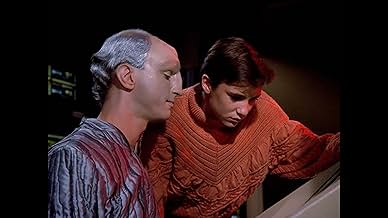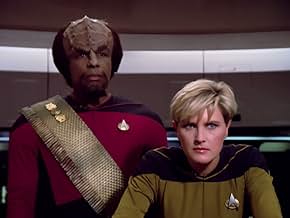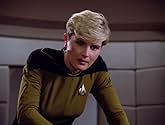Where No One Has Gone Before
- Episode aired Oct 24, 1987
- TV-PG
- 45m
IMDb RATING
7.5/10
5.1K
YOUR RATING
Everyone accurately pegs a visiting propulsion scientist as a charlatan, but only Wesley Crusher recognizes his alien assistant as the real deal.Everyone accurately pegs a visiting propulsion scientist as a charlatan, but only Wesley Crusher recognizes his alien assistant as the real deal.Everyone accurately pegs a visiting propulsion scientist as a charlatan, but only Wesley Crusher recognizes his alien assistant as the real deal.
James G. Becker
- Youngblood
- (uncredited)
Byron Berline
- Officer playing Violin
- (uncredited)
Darrell Burris
- Operations Officer
- (uncredited)
Featured reviews
'Where No One Has Gone Before' isn't perfect, but it makes for pretty good first season fair. Unfortunately, it involves a lot of Wesley and sort of fizzles out late in the game, but it does lure you in with some solid science fiction. The pompous engineering guy, Kosinski (onboard to push the ship's engine past its limits with a new formula) drives a lot of this, and I did like Riker politely-but-firmly keeping him in his place (Frakes' presence is surprising me in these early episodes). And the warp sequence was pretty cool.
But trippy effects aside, what surpassing Warp 10 does is give this a distinct sense of adventure; barriers are broken, a new galaxy is breached and we're truly sailing into the unknown. It's the kind of nervous excitement they tried to build "Voyager" on, but . . . eh, that didn't go so well.
Not bad.
7/10
But trippy effects aside, what surpassing Warp 10 does is give this a distinct sense of adventure; barriers are broken, a new galaxy is breached and we're truly sailing into the unknown. It's the kind of nervous excitement they tried to build "Voyager" on, but . . . eh, that didn't go so well.
Not bad.
7/10
This is a personal highlight from a season with little to have a song and dance about. The Enterprise is thrown many lightyears from home by a mistake made by two guests called Kosinski and the Traveller. Interestingly, the actor who plays the Traveller was in the running to play Data. It's a superb episode which shows the strength of the main cast as well as displaying some great guest performances from the wonderfully arrogant Kosinski and the mysterious Traveller. There are also some rather splendid graphics here and there. However, the corniness of this first season as a whole shines through when Picard is forced to encourage his crew to "believe" their way out of it, but it is a forgivable little cringe.
This is one of the better season 1 episodes. Wesley has a nice new orange sweater and what look like corduroy pants but not quite. Turns out Wesley is a warp field Mozart with an intuitive grasp of the interrelated nature of space, time, and thought. A hidden relationship between thought and the material world is a recurring theme in Star Trek that I rather like.
It's also hard not to compare and contrast the The Traveler with Q as they are both member's of species that live unconstrained by time. Portal and Nagilum also come to mind as it seems season 1 is all about humanity being tested and examined by beings with greater knowledge and power.
I think I am beginning to understand what's going on with Wesley. As a character, he is given more attention than the main cast we come to know and love by the end of the show. Why? Brace yourself for some grade A armchair psychology:
Wesley is Gene Roddenberry romanticizing a childhood he wished he himself had had. Roddenberry projected his idealized version of the future onto the world through Star Trek, and an idealized version of his childhood through Wesley. He gives Wesley the extra attention he wished he would have gotten as a boy, and we hate Wesley because we know he doesn't deserve the attention that he gets. He hasn't earned it. He's the kid who got the blue ribbon because he tried hard and the adults felt sorry for him, not because he was actually any good. We are repeatedly told he is wonderful and special, but we hate him because it never feels true.
Wesley might have worked as a character if he had been fleshed out over the course of the entire season. Seeing him earn the commission of acting ensign might have been satisfying if it took place in episode 26, perhaps after some act of valor. Instead, he's got it by episode 5 after looking over an alien's shoulder, and it just feels forced.
Verdict: Watchable and memorable, but irksome.
Fun Facts:
The Hubble can see well over ten billion light years, nine times further than Picard's estimate of the distance the Enterprise traveled in this episode.
The distance to M33 is accurately stated according to the internet.
If it takes 300 years to travel the 2.7 million light years we can approximate maximum warp to a little bit more than one light year per hour. 2,700,000 div 300 year gives 9000 light years per year. Div 365 gives 24.65 ligh years per day. Div 24 gives 1.027 light years per hour. WooWee!
Subspace radio speed can be calculated in a similar manner. 2,700,000 div 52 years (10 months and 9 weeks, really Data!?) is 5.92 light years per hour.
It's also hard not to compare and contrast the The Traveler with Q as they are both member's of species that live unconstrained by time. Portal and Nagilum also come to mind as it seems season 1 is all about humanity being tested and examined by beings with greater knowledge and power.
I think I am beginning to understand what's going on with Wesley. As a character, he is given more attention than the main cast we come to know and love by the end of the show. Why? Brace yourself for some grade A armchair psychology:
Wesley is Gene Roddenberry romanticizing a childhood he wished he himself had had. Roddenberry projected his idealized version of the future onto the world through Star Trek, and an idealized version of his childhood through Wesley. He gives Wesley the extra attention he wished he would have gotten as a boy, and we hate Wesley because we know he doesn't deserve the attention that he gets. He hasn't earned it. He's the kid who got the blue ribbon because he tried hard and the adults felt sorry for him, not because he was actually any good. We are repeatedly told he is wonderful and special, but we hate him because it never feels true.
Wesley might have worked as a character if he had been fleshed out over the course of the entire season. Seeing him earn the commission of acting ensign might have been satisfying if it took place in episode 26, perhaps after some act of valor. Instead, he's got it by episode 5 after looking over an alien's shoulder, and it just feels forced.
Verdict: Watchable and memorable, but irksome.
Fun Facts:
The Hubble can see well over ten billion light years, nine times further than Picard's estimate of the distance the Enterprise traveled in this episode.
The distance to M33 is accurately stated according to the internet.
If it takes 300 years to travel the 2.7 million light years we can approximate maximum warp to a little bit more than one light year per hour. 2,700,000 div 300 year gives 9000 light years per year. Div 365 gives 24.65 ligh years per day. Div 24 gives 1.027 light years per hour. WooWee!
Subspace radio speed can be calculated in a similar manner. 2,700,000 div 52 years (10 months and 9 weeks, really Data!?) is 5.92 light years per hour.
This is the best episode so far. What makes it so is that the laws of physics become accessible to the broad array of characters. The Enterprise and its ilk have the greatest potential but they are limited by their very structures and the forces of time and space. So we need to have a force of some kind enter the picture. This is what happens with the Traveller. We also come to realize that while raw and impulsive, Wesley Crusher is a key figure. I know he is an annoying kid, but he is the focal point here. Something must be done as the crew fly across the universe, arriving at galaxies that could only be dreamed of. The Traveller is the embodiment of an x-factor to go beyond and yet integrate the physics they are dealing with. There are some marvelous twists and turns here. Characters and objects fade in and out during warping. At some point, one has to admit some sense of defeat and draw in the forces that are not understandable to the mere mortal. I found this episode really interesting.
The Enterprise's engines are tested by a Federation expert and his assistant in order to boost the ship's engines. When the initial test run goes wrong, the ship finds itself marooned in an area of space far beyond what has previously been explored.
The first episode to really expose Wesley Crusher's role on the ship as a "solve-all", this episode feels far closer to the spirit of the original series than the previous episodes as it explores the human condition as well as the perils of deep, deep space. The effects are a little clunky but the script makes up for it and is easily one of the best season one episodes thus far.
The first episode to really expose Wesley Crusher's role on the ship as a "solve-all", this episode feels far closer to the spirit of the original series than the previous episodes as it explores the human condition as well as the perils of deep, deep space. The effects are a little clunky but the script makes up for it and is easily one of the best season one episodes thus far.
Did you know
- TriviaProducer Robert H. Justman said that hiring 27-year-old Rob Bowman to direct this segment was one of his proudest achievements on the show. Bowman was terrified, trying to make a good impression on his first assignment, and overcome any doubts of his youth.
- GoofsWhen Kosinski enters the bridge after his 'experiment' unexpectedly sends the Enterprise to another galaxy, he begins explaining the process by which this error occurred. He states that "as the power grew, [he] applied the power 'asymptomatically'" which would imply that he applied power with no symptoms or otherwise discernible effects. It seems far more likely that the script read "applied the power 'asymptotically'", meaning that the power application tended to some arbitrary limit (the term 'asymptote' is often used in mathematics to describe the curve of a graph tending toward infinity).
- Quotes
Lt. Commander Data: Captain, we're here. Why not avail ourselves of this opportunity for study? There is a giant protostar here in the process of forming. No other vessel has been out this far.
Captain Jean-Luc Picard: Spoken like a true Starfleet graduate.
- ConnectionsReferenced in Star Trek: Voyager: Caretaker (1995)
- SoundtracksStar Trek: The Next Generation Main Title
Composed by Jerry Goldsmith and Alexander Courage
Details
- Runtime
- 45m
- Color
- Sound mix
- Aspect ratio
- 1.33 : 1
Contribute to this page
Suggest an edit or add missing content

























